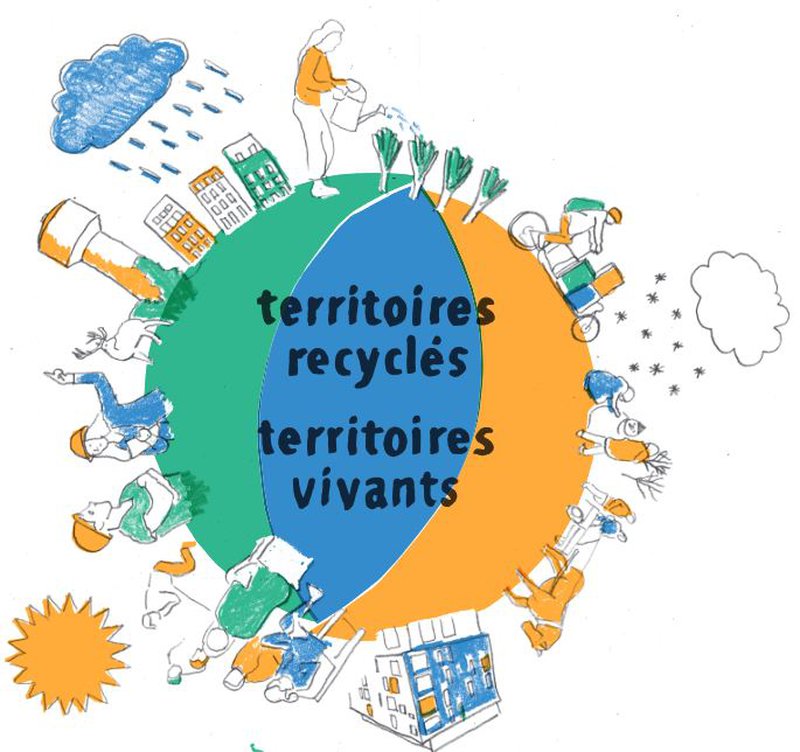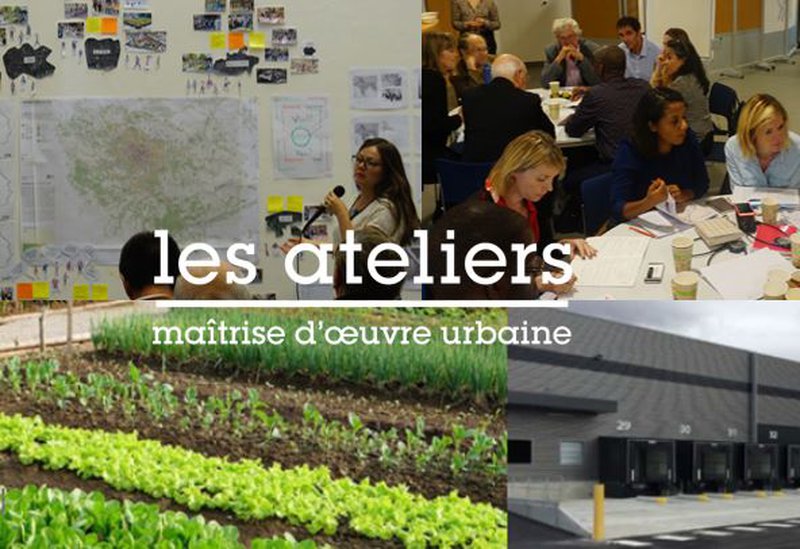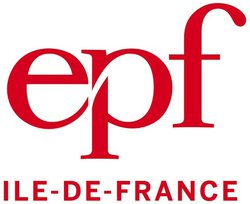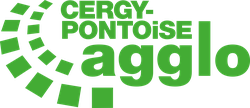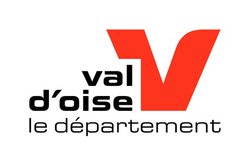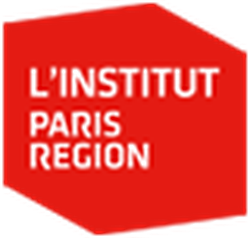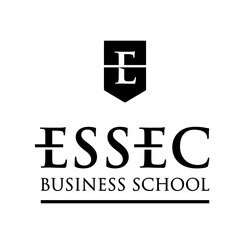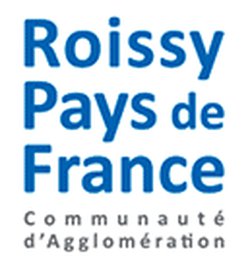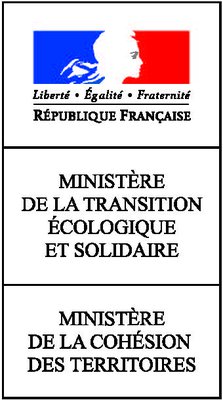Recycled territories, living territories
Successive crises (climate, health, geopolitics, etc.) are changing our world: natural global and local equilibriums are being disrupted, the vulnerabilities of the global economy are being exposed, and inequalities are being accentuated. These transformations call into question our habits, our relationships with others and our surroundings as well as our ways of living, working, consuming and flourishing.
The degrees of interdependence between distant territories makes the supplying of urban populations fragile. At the same time, they underline the value of proximity and local resources, which are more accessible and more resilient. They invite us to look at the territory of a city and its population as living entities with their own systems of balances, capable of producing what is necessary for life without harming future generations.
This means engaging in a paradigm shift that alters our perceptions of life and the earth, transforms waste into resources and requires us to reconsider the links between the city and its hinterland. What kind of city models for what kind of lifestyle do we want?
There is still time to face up to the responsibility of the impending climate emergency and to react.
For this 40th session of the Paris Region International Urban Planning Workshop, Les Ateliers proposes to use the exploration of a large-scale territory — the northern arc of the Île-de-France, the hinterland of the Parisian metropolis’ beating heart — to illustrate the work and proposals of the participants.
The territory’s role and its position, in direct contact with the metropolis, will be questioned and will have to be reexamined on several levels:
- At the level of territorial metabolism: From the supply of products and services to the treatment of waste
According to Sabine Barles, territorial metabolism refers to “all the energy and material flows involved in the functioning of a given territory” (Barles 2017).
This notion of metabolism is borrowed from the field of medicine and describes the city (or metropolis) as a body which consumes, distributes and transforms resources before eliminating the resulting waste. The major difference is that the metabolism of the human body cannot be modified, unlike that of the city.
In order to live, the city must be supplied with products and services in different forms: water, electricity, food, objects, etc. Some of these products and services are partly or wholly derived from or produced locally, such as certain foodstuffs, while others are imported from other territories on a massive scale.
At the end of the day, waste is what is discarded by territories in the broadest sense. It can be visible or invisible (pollution) and is defined by its almost zero or even negative value. Primacy is given to energy recovery without addressing the issue of material recovery.
- From the point of view of lifestyles and consumption
Supply is strongly linked to uses, lifestyles and consumption patterns. The rule of supply and demand influences markets and sectors. The growing awareness of consumers of the environmental and health impacts of their practices can lead to a systemic change in production and supply methods in territories. In a context of emerging uses driven by new technologies, these changes can be more or less rapid as well as more or less virtuous. Public policies and the actors who organize activities in territories interact with these practices and can accompany the movements underway.
How can we transform our cities and their territories to make them more modest, happier, more resilient and more alive?
What new decision-making tools should be used by local, political and civil actors to initiate the necessary changes in our societies?
How can the development of cities be designed to be more in line and coherent with their environments?
How can we simultaneously meet the energy needs of the metropolis more locally, anchor food supply, decarbonize the construction sector and envisage an urban development that does not come at the expense of nature?
Innovation, creativity, foresight, collaboration
For the past 40 years, the association has been bringing together, every year in September in the Île-de-France region, some twenty students and young professionals of various nationalities and profiles, who work on-site in multidisciplinary teams and present their proposals and strategies at the end of the workshop to an international jury chaired by local authorities. The teams’ proposals combine long-term visions for the territories with illustrated ideas for action, thus creating an array of potential projects for local decision-makers.
From its inception to its current success with a network of more than 3,000 former participants, Les Ateliers has taken the approach of addressing complex issues with an open mind and on several scales, allowing space for reflection outside of the traditional institutional context.
Apply for the workshop!
The workshop is open to students at the end of their studies and to young professionals up to the age of 30, from all disciplines (urban planning, art, economics, agronomy, sociology, logistics, engineering, architecture, history, architecture, landscape design, etc.) and of all nationalities.
documents
-
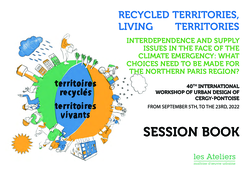
Session Book - Recycled Territories
-
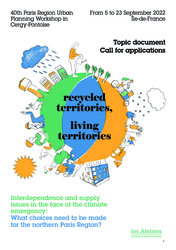
Call for applications - 40th Paris Region Workshop
-
Application form
-
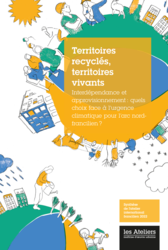
Synthèse 40ème atelier - Territoires Recyclés
-
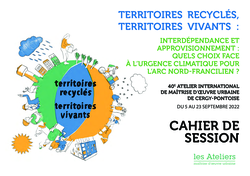
Cahier de session - Territoires recyclés
-
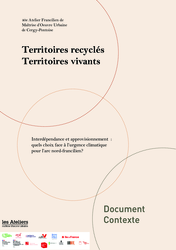
Document contexte 40e atelier
-
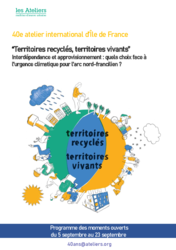
Programme moments ouverts 40e atelier Francilien
-
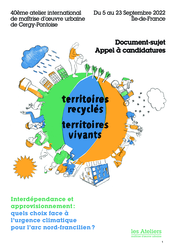
Appel a candidatures 40e atelier francilien 2022
-
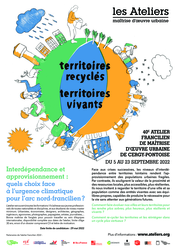
Affiche_sujet_40e_atelier_territoires_recycles_territoires_vivants
staff
Pilots of the workshop:
Faustine Vidberg, Architect and urban planner, TGTFP
Jean Michel Evin, Geographer, expert in urban planning and large projects
Assistant pilots:
Salwa Cherkaoui, Architect and urban planner,
Paulina Kofler-Warnier, European and Anglo-American Affairs
Sheldon Morris, Architect and urban planner,


